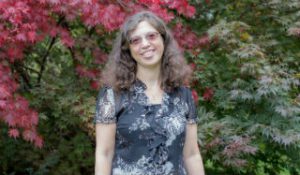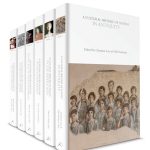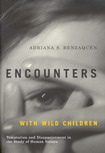Associate Professor
BA, MA, PhD, York University
902-457-6596
adriana.benzaquen@msvu.ca
 Adriana Benzaquén grew up in Buenos Aires, Argentina, and lived in Toronto, New York and Vancouver before coming to the Mount in 2001. She received her Ph.D. from York University (Toronto) in 1999 and her doctoral dissertation won awards from the Northeastern Association of Graduate Schools and the York University Faculty of Graduate Studies.
Adriana Benzaquén grew up in Buenos Aires, Argentina, and lived in Toronto, New York and Vancouver before coming to the Mount in 2001. She received her Ph.D. from York University (Toronto) in 1999 and her doctoral dissertation won awards from the Northeastern Association of Graduate Schools and the York University Faculty of Graduate Studies.
Teaching
Dr. Benzaquén teaches early modern European history, intellectual and cultural history, the history of childhood, and the history of women. She regularly offers these courses:
- HIST 2211 Explorers, Artists and Reformers: Renaissance and Reformation Europe
- HIST 2207 Social History of European Women
- HIST 2220 Reason and Light: The Enlightenment in Europe
- HIST 2281 History of Childhood: The European Experience
- HIST 2285 Love, Sexuality and the Body in European History
- HIST 3305 Life Cycles of Early Modern Women and Men
- HIST 3314 Witches, Witch-Hunters and Scholars in Early Modern Europe
- HIST 3315 The French Revolution and Napoleon
- HIST 3390 Historiography
- HIST 4480 History Seminar (Europe)
Research
My current book project, tentatively titled “Locke’s Children: Parents, Children, and Educational Designs in England, 1660-1720,” is a study of the children in John Locke’s extensive circle of friends and acquaintances, in particular the Somerset politician and landowner Edward Clarke and his wife Mary. The correspondence of Locke and his friends offers a wealth of information about children’s lives and their relationships with their parents, siblings, servants, relatives, teachers and friends. In-depth analysis of this correspondence makes it possible to distinguish elements that were common to many childhoods in this period from those that varied, even within a single family, based on gender, birth order, ability and personality. The book will consider the extent to which Locke’s views on children and his advice concerning education were based on his own experiences with and observations of children; the social and interpersonal dynamics between Locke as “expert” and the parents, tutors and children who solicited, were expected to apply, or were the recipients of, expert advice, and the unprecedented pressure exerted on children as a result of new educational theories and standards and a new social and economic environment (rising educational expectations, professionalization).
In parallel, through the study of the Clarke letters and papers I have become interested in the figure of Mary Clarke (c.1656-1706). Mary Clarke’s life was both typical and extraordinary. Her adult experiences were those of most women of her rank and position: marriage, the births and deaths of children, the management of her household, friendship, illness. She was not intellectually gifted like the other female correspondents of Locke’s who have attracted scholarly attention (such as Damaris Masham and Catherine Trotter), but her letters, written in a distinctive, strong voice, offer a unique window into the life of an ordinary woman of her class and her time. Indeed, it was through (and in) her letters that Mary was able to face the challenges of her life, reflect on her experiences, and define and redefine her identity as a woman, wife, mother, mistress of the household, and friend.
Together, these projects shed light on the intersection between a famous figure and the ordinary (but privileged) people whose lives were entangled with his and between early modern constructions of childhood and gender and the everyday experiences of children, women, and men.
Selected Publications
“‘These small sumptomes of my obediense’: Negotiating Father-Son Conflict through Letter-Writing in Early Modern England.” Journal of the History of Childhood and Youth 17, no 1 (Winter 2024): 5-25.
 Editor of A Cultural History of Youth in the Age of Enlightenment. Vol. 4 of A Cultural History of Youth. General eds.: Stephanie Olsen and Heidi Morrison. London: Bloomsbury, 2023.
Editor of A Cultural History of Youth in the Age of Enlightenment. Vol. 4 of A Cultural History of Youth. General eds.: Stephanie Olsen and Heidi Morrison. London: Bloomsbury, 2023.
“Introduction.” In A Cultural History of Youth in the Age of Enlightenment. Ed. Adriana Benzaquén. London: Bloomsbury, 2023, 1-19.
“Contested Territory: Non-Elite Youth and Youth Culture in the Premodern West.” Oxford Handbook of the History of Youth Culture. Ed. James Marten. New York: Oxford University Press, 2023, 59-75 (published online in 2021).
“Illness and Death.” In Early Modern Childhood: An Introduction. Ed. Anna French. London: Routledge, 2020, 196-216.
“‘Pray lett none see this impertinent Epistle’: Children’s Letters and Children in Letters at the Turn of the Eighteenth Century.” In Literary Cultures and Eighteenth-Century Childhoods. Ed. Andrew O’Malley. Palgrave Macmillan, 2018, 75-96.
“Educational Designs: The Education and Training of Younger Sons at the Turn of the Eighteenth Century.” Journal of Family History 40, no. 4 (Fall 2015): 462-84.
“‘No greater Pleasure in this Life’: The Friendship of John Locke and Edward Clarke.” In Friendship and Sociability in Premodern Europe: Contexts, Concepts and Expressions. Ed. Amyrose McCue Gill and Sarah Rolfe Prodan. Toronto: Centre for Reformation and Renaissance Studies, University of Toronto, 2014, 43-70.
“Locke’s Children,” Journal of the History of Childhood and Youth 4, no. 3 (Fall 2011): 382-402.
“World Contexts,” in A Cultural History of Childhood and Family in the Age of Enlightenment (1650-1800), ed. James Marten and Elizabeth Foyster (Oxford: Berg, 2010), 185-204.
 Encounters with Wild Children: Temptation and Disappointment in the Study of Human Nature (Montreal: McGill-Queen’s University Press, 2006).
Encounters with Wild Children: Temptation and Disappointment in the Study of Human Nature (Montreal: McGill-Queen’s University Press, 2006).
- For a review of Encounters with Wild Children in Journal of the History of Behavioral Sciences 43, no. 4 (Fall 2007), visit the Wiley Online Library.
- The review in History Workshop Journal 65, no. 1 (Spring 2008).
- Listen to the BBC Radio 4 documentary “Case Study: The Wild Boy of Aveyron,” where Dr. Benzaquén and other scholars discuss the case of Victor of Aveyron.
“The Doctor and the Child: Medical Preservation and Management of Children in the Eighteenth Century,” in Fashioning Childhood in the Eighteenth Century: Age and Identity, ed. Anja Müller (Aldershot: Ashgate, 2006), 13-24.
“Childhood, Identity, and Human Science in the Enlightenment,” History Workshop Journal 57 (Spring 2004): 34-57.
“Childhood, History, and the Sciences of Childhood,” in Multiple Lenses, Multiple Images: Perspectives on the Child Across Time, Space, and Disciplines, ed. Hillel Goelman, Sheila K. Marshall and Sally Ross (Toronto: University of Toronto Press, 2004), 14-37.